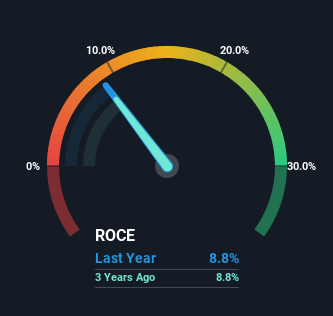Südwestdeutsche Salzwerke (FRA:SSH) Could Be Struggling To Allocate Capital
There are a few key trends to look for if we want to identify the next multi-bagger. Typically, we'll want to notice a trend of growing return on capital employed (ROCE) and alongside that, an expanding base of capital employed. Basically this means that a company has profitable initiatives that it can continue to reinvest in, which is a trait of a compounding machine. Having said that, from a first glance at Südwestdeutsche Salzwerke (FRA:SSH) we aren't jumping out of our chairs at how returns are trending, but let's have a deeper look.
What Is Return On Capital Employed (ROCE)?
If you haven't worked with ROCE before, it measures the 'return' (pre-tax profit) a company generates from capital employed in its business. To calculate this metric for Südwestdeutsche Salzwerke, this is the formula:
Return on Capital Employed = Earnings Before Interest and Tax (EBIT) ÷ (Total Assets - Current Liabilities)
0.088 = €32m ÷ (€409m - €44m) (Based on the trailing twelve months to June 2023).
So, Südwestdeutsche Salzwerke has an ROCE of 8.8%. In absolute terms, that's a low return but it's around the Food industry average of 11%.
View our latest analysis for Südwestdeutsche Salzwerke

Historical performance is a great place to start when researching a stock so above you can see the gauge for Südwestdeutsche Salzwerke's ROCE against it's prior returns. If you want to delve into the historical earnings, revenue and cash flow of Südwestdeutsche Salzwerke, check out these free graphs here.
How Are Returns Trending?
When we looked at the ROCE trend at Südwestdeutsche Salzwerke, we didn't gain much confidence. To be more specific, ROCE has fallen from 12% over the last five years. On the other hand, the company has been employing more capital without a corresponding improvement in sales in the last year, which could suggest these investments are longer term plays. It may take some time before the company starts to see any change in earnings from these investments.
The Key Takeaway
To conclude, we've found that Südwestdeutsche Salzwerke is reinvesting in the business, but returns have been falling. And with the stock having returned a mere 35% in the last five years to shareholders, you could argue that they're aware of these lackluster trends. So if you're looking for a multi-bagger, the underlying trends indicate you may have better chances elsewhere.
If you want to know some of the risks facing Südwestdeutsche Salzwerke we've found 3 warning signs (1 makes us a bit uncomfortable!) that you should be aware of before investing here.
If you want to search for solid companies with great earnings, check out this free list of companies with good balance sheets and impressive returns on equity.
New: Manage All Your Stock Portfolios in One Place
We've created the ultimate portfolio companion for stock investors, and it's free.
• Connect an unlimited number of Portfolios and see your total in one currency
• Be alerted to new Warning Signs or Risks via email or mobile
• Track the Fair Value of your stocks
Have feedback on this article? Concerned about the content? Get in touch with us directly. Alternatively, email editorial-team (at) simplywallst.com.
This article by Simply Wall St is general in nature. We provide commentary based on historical data and analyst forecasts only using an unbiased methodology and our articles are not intended to be financial advice. It does not constitute a recommendation to buy or sell any stock, and does not take account of your objectives, or your financial situation. We aim to bring you long-term focused analysis driven by fundamental data. Note that our analysis may not factor in the latest price-sensitive company announcements or qualitative material. Simply Wall St has no position in any stocks mentioned.
About DB:SSH
Südwestdeutsche Salzwerke
Südwestdeutsche Salzwerke AG, together with its subsidiaries, mines, produces, and sells salt in Germany, the European Union, and internationally.
Flawless balance sheet average dividend payer.
Similar Companies
Market Insights
Community Narratives



